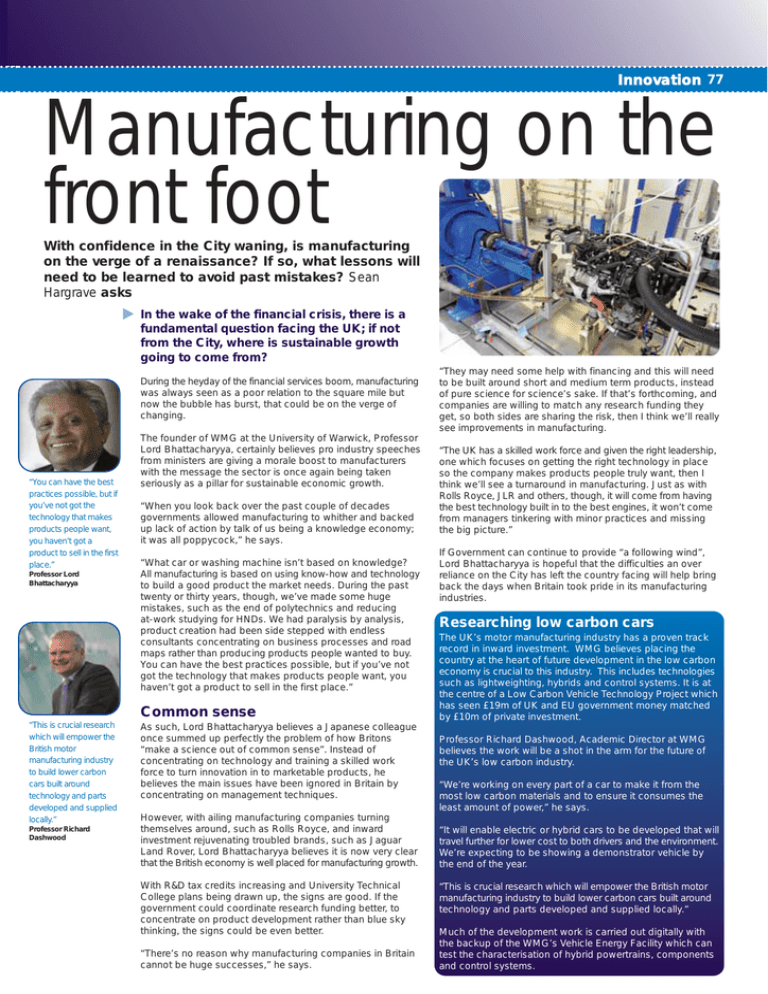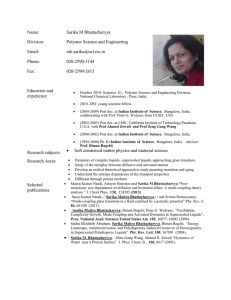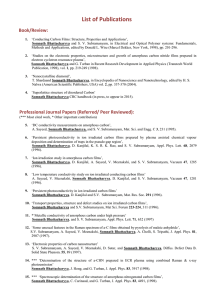Innovation 77
advertisement

Innovation 77 Manufacturing on the front foot With confidence in the City waning, is manufacturing on the verge of a renaissance? If so, what lessons will need to be learned to avoid past mistakes? Sean Hargrave asks ▲ In the wake of the financial crisis, there is a fundamental question facing the UK; if not from the City, where is sustainable growth going to come from? During the heyday of the financial services boom, manufacturing was always seen as a poor relation to the square mile but now the bubble has burst, that could be on the verge of changing. “You can have the best practices possible, but if you’ve not got the technology that makes products people want, you haven’t got a product to sell in the first place.” Professor Lord Bhattacharyya The founder of WMG at the University of Warwick, Professor Lord Bhattacharyya, certainly believes pro industry speeches from ministers are giving a morale boost to manufacturers with the message the sector is once again being taken seriously as a pillar for sustainable economic growth. “When you look back over the past couple of decades governments allowed manufacturing to whither and backed up lack of action by talk of us being a knowledge economy; it was all poppycock,” he says. “What car or washing machine isn’t based on knowledge? All manufacturing is based on using know-how and technology to build a good product the market needs. During the past twenty or thirty years, though, we’ve made some huge mistakes, such as the end of polytechnics and reducing at-work studying for HNDs. We had paralysis by analysis, product creation had been side stepped with endless consultants concentrating on business processes and road maps rather than producing products people wanted to buy. You can have the best practices possible, but if you’ve not got the technology that makes products people want, you haven’t got a product to sell in the first place.” Common sense “This is crucial research which will empower the British motor manufacturing industry to build lower carbon cars built around technology and parts developed and supplied locally.” Professor Richard Dashwood As such, Lord Bhattacharyya believes a Japanese colleague once summed up perfectly the problem of how Britons “make a science out of common sense”. Instead of concentrating on technology and training a skilled work force to turn innovation in to marketable products, he believes the main issues have been ignored in Britain by concentrating on management techniques. However, with ailing manufacturing companies turning themselves around, such as Rolls Royce, and inward investment rejuvenating troubled brands, such as Jaguar Land Rover, Lord Bhattacharyya believes it is now very clear that the British economy is well placed for manufacturing growth. With R&D tax credits increasing and University Technical College plans being drawn up, the signs are good. If the government could coordinate research funding better, to concentrate on product development rather than blue sky thinking, the signs could be even better. “There’s no reason why manufacturing companies in Britain cannot be huge successes,” he says. “They may need some help with financing and this will need to be built around short and medium term products, instead of pure science for science’s sake. If that’s forthcoming, and companies are willing to match any research funding they get, so both sides are sharing the risk, then I think we’ll really see improvements in manufacturing. “The UK has a skilled work force and given the right leadership, one which focuses on getting the right technology in place so the company makes products people truly want, then I think we’ll see a turnaround in manufacturing. Just as with Rolls Royce, JLR and others, though, it will come from having the best technology built in to the best engines, it won’t come from managers tinkering with minor practices and missing the big picture.” If Government can continue to provide “a following wind”, Lord Bhattacharyya is hopeful that the difficulties an over reliance on the City has left the country facing will help bring back the days when Britain took pride in its manufacturing industries. Researching low carbon cars The UK’s motor manufacturing industry has a proven track record in inward investment. WMG believes placing the country at the heart of future development in the low carbon economy is crucial to this industry. This includes technologies such as lightweighting, hybrids and control systems. It is at the centre of a Low Carbon Vehicle Technology Project which has seen £19m of UK and EU government money matched by £10m of private investment. Professor Richard Dashwood, Academic Director at WMG believes the work will be a shot in the arm for the future of the UK’s low carbon industry. “We’re working on every part of a car to make it from the most low carbon materials and to ensure it consumes the least amount of power,” he says. “It will enable electric or hybrid cars to be developed that will travel further for lower cost to both drivers and the environment. We’re expecting to be showing a demonstrator vehicle by the end of the year. “This is crucial research which will empower the British motor manufacturing industry to build lower carbon cars built around technology and parts developed and supplied locally.” Much of the development work is carried out digitally with the backup of the WMG’s Vehicle Energy Facility which can test the characterisation of hybrid powertrains, components and control systems.







